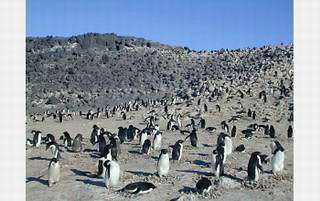Hormones may lead penguins to kidnapping

A French researcher says hormones might help explain why female emperor penguins that have lost a baby sometimes kidnap a chick from another penguin.
The snatching behavior -- seen briefly in the Oscar-winning movie "March of the Penguins" -- has long puzzled scientists.
"The kidnapping lasts for a few hours or a week at most," Olivier Chastel, a biologist at Paris's French National Center for Scientific Research, told National Geographic News. After that time the kidnapper penguin seemingly loses interest and abandons her stolen chick.
"The abandoned hungry chicks usually die from the cold or predation," said Chastel. "There is no clear evolutionary advantage. In other words the kidnapping practice doesn't seem to help chicks survive and therefore pass on their genes to the next generation."
However, NGN says a new study indicates a hormone that influences the penguins' parenting urges might be driving the birds to steal chicks.
Scientists detail that hypothesis in this week's Journal of Experimental Biology.
Copyright 2006 by United Press International


















